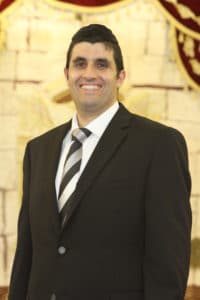Parasha Thoughts
By Rabbi David Cohen
And when it comes to pass that Pharaoh calls you, he will ask, ‘What is your occupation?’ Bereshit 46:33
Yosef ’s family arrives in Egypt. And Yosef knows that he will eventually have to introduce them to Pharaoh. Given the importance of this encounter, it isn’t surprising that Yosef — by now a sophisticated politician — wanted to prepare his family for their first meeting with Pharaoh. So he tells them, soon you will meet Pharaoh. And he also tells them exactly what it is Pharaoh is going to want to know: “What do you do?†Yosef then tells his family what to say: Your servants have been shepherds from our youth until now. Not only have we been shepherds, but also our ancestors.’
In Egypt, being a shepherd isn’t something you would want to readily admit. As Yosef quickly notes, shepherds are despised: Ö¼”All shepherds are an abomination to the Egyptians.” The Torah itself doesn’t tell us exactly why it is that shepherds are despised in Egypt. But as Rabbi Samson Raphael Hirsch notes earlier in Sefer Bereishit,5 it is presumably because Egyptians despised the lifestyle of being a shepherd. Shepherds were nomads, wandering the earth without the trappings of success. They had no permanent property, which is what Egyptian culture prized. In Egypt, you moved up the caste system to the extent that you were a wealthy landed property owner, and therefore nothing could be more despised than a shepherd.
Indeed, the importance of wealth and property in Egypt is clear from Pharaoh’s first question to Yosef ’s family: “What do you do?†This is what Pharaoh needed to know in order to evaluate Yosef ’s family — Pharaoh knows that their place is at the very bottom of Egyptian culture. Given all of this, one can only imagine that Yosef would feel quite uncomfortable about this anticipated exchange. Yosef had risen to the very top of the Egyptian political machine. His family, as lowly shepherds, would be an embarrassment — and maybe even a reminder to all of Yosef ’s own origins as a lowly slave brought in chains down to Egypt. As a result, we might have excused Yosef had he told his brothers not to mention that they were shepherds. But Yosef did the opposite and it begs the question: why was this so important to Yosef?
Shepherds are the searchers and the seekers. They are the ones who want to explore the expanse of the heavens and plumb the depths of the universe to understand God’s wisdom. And for this reason, shepherds repeatedly stand at the very center of our nation’s long intellectual tradition. They live the life of an intellectual nomad, wandering the universe to unravel its mysteries. Such a worldview emerged at odds with Egyptian culture. Egypt prized accomplishment, seeing it as a function of permanent wealth. A nation of shepherds prizes exploration, seeing it as a mechanism for understanding and wisdom. Egypt valued people based upon what they owned. A nation of shepherds values people based upon what they’ve learned.
As Jews, we should be proud of our desire to learn Torah and seek a closer relationship with Hashem. We shouldn’t fall into the trap that society lays for us in the pursuit of the materialistic.

